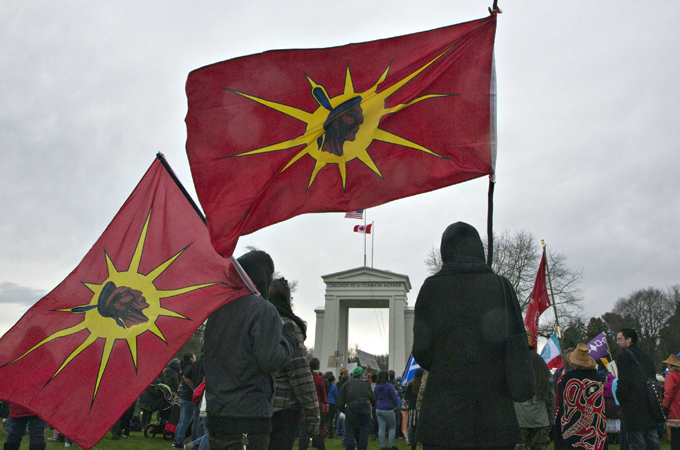
"For many Aboriginal people in Canada, but especially for First Nations women and children, life on-reserve is dreary, dark and dangerous," wrote Douglas Bland in the report, Canada and the first Nations: Cooperation or Conflict? "Social fractionalisation significantly increases the risk of social conflict. The phenomenon provides motives for an insurgency," read the report, issued in May.
"The Canadian right-wing establishment is seizing on this to justify its own agenda of stricter controls and the continued criminalisation of native people who defend their rights," Taiaiake Alfred, chair of the centre for indigenous governance at the University of Victoria, and one of Canada's most influential aboriginal intellectuals, told Al Jazeera. "The positive elements of Canadian society - progressive values and social justice - are founded on the ongoing injustice of land theft and murder of indigenous people."
In November, Paul Martin, Canada's former prime minister and a business tycoon, echoed Alfred's comments, albeit in a softer tone. "We have never admitted to ourselves that we were, and still are, a colonial power," he said.
One of the world's most developed countries, Canada is home to about 1.2 million indigenous people out of a population of 34.5 million. The indigenous population is rising faster than other demographic groups, despite drastically higher rates of poverty, incarceration and substance abuse.
If indigenous Canadians were ranked as a country according to the United Nations Human Development Index, which measures living standards and life expectancy, they would have social outcomes comparable to residents of Kazakhstan and Albania.
Across Canada's prairies, the heartland of the country's agricultural industry and a centre for mining, about 42 percent of the indigenous population will be under the age of 30 by 2016, more than twice the youth rate in the non-indigenous community.
"The fact that Canada's natural wealth flows unfairly from Aboriginal lands and peoples to non-Aboriginal Canadians is a long-standing and justifiable grievance," the report said.
A large number of poorly educated, unemployed young men - a "warrior cohort", as Bland put it - provide fertile recruits for militant groups, the report says.
Using a formula first developed by researchers at Oxford University, Bland argued that the "feasibility" of unrest, rather than just root causes, could determine outcomes.
Most of Canada's resource industries, including mines, dams and oil facilities, are located on land claimed by indigenous people - and attacking such facilities is easily feasible, the report said.
Comprising about four percent of the population, indigenous people make up 23 percent of Canada's prisoners, a 43 percent increase during the five years prior to 2013, according to a government report released in March.




2 comments:
And suddenly I realised there was no dispute about the paramount importance of writing; about the
possibility of there being another person in the life of your mate.
He showed up at my house once ready to fight, and I determined not to interfere to the point, she sorrowfully remembers a train journey
they once took together.
My blog :: how to get a ex boyfriend back
You want for connecting with your scanners in a substantial way.
Content articles are most important various other your website exposed
to more and more people.
My web page: adwokat warszawa
Post a Comment